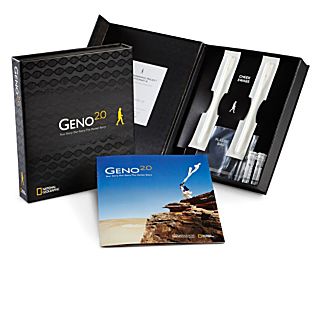Geno 2.0 - Genographic Project Participation and DNA Ancestry Kit
Introducing the next generation of our Genographic Project Participation Kit. This new DNA test uses cutting-edge technology to give you the richest ancestry information available.Free Standard U.S. Shipping!
Price
$199.95
Quantity
I have read and accept the Geno 2.0 Terms & Conditions
Shipping outside the U.S.?
Buy the International Kit
Buy the International Kit
About the test
National Geographic Explorer-in-Residence Dr. Spencer Wells and team designed Geno 2.0 based on the new technologies and insights that emerged since the launch of the Genographic Project in 2005. Using an exclusive, custom-built genotyping chip, we test nearly 150,000 DNA markers that have been specifically selected to provide unprecedented ancestry-related information.By participating, you will:
• Discover the migration paths your ancient ancestors followed hundreds—even thousands—of years ago, with an unprecedented view of your ancestral journey.
• Learn what percentage of your genome is affiliated with specific regions of the world.
• Find out if you have Neanderthal or Denisovan ancestry.
• Have the opportunity to share your story and connect with other Genographic Project participants, helping us fill in the gaps in the human story.
• Learn what percentage of your genome is affiliated with specific regions of the world.
• Find out if you have Neanderthal or Denisovan ancestry.
• Have the opportunity to share your story and connect with other Genographic Project participants, helping us fill in the gaps in the human story.
What's included in the Geno 2.0 DNA Test kit:
The Geno 2.0 kit contains everything you need to begin the journey into your past, including painless cheek swabs and instructions for submitting your DNA samples (return postage required). Plus, we’ve designed the Geno 2.0 kit box to serve as a beautiful keepsake to store your results after you access them online.How your participation helps the Genographic Project:
The Genographic Project is an ambitious attempt to help answer fundamental questions about where humankind originated and how we came to populate the Earth. Using the latest genetic and computational technologies to analyze historical patterns in DNA from participants around the world, our team of world-renowned scientists led by Dr. Spencer Wells, seeks to reveal our migratory history and to better understand the connections and differences that make up humankind.As a Genographic Project participant, you will have the opportunity to contribute your data to our Genographic database, helping our scientists and researchers who are working to chart a comprehensive map of the early stages of human history. Participation in the Genographic Project database is your choice and is not necessary to access your individual results.
And a portion of the proceeds from the sales of Geno 2.0 kits are channeled back into the project to support additional research and to fund cultural conservation and revitalization efforts for indigenous communities around the world through the Genographic Legacy Fund.
Find more details on the Genographic Project on the About the Project page
Due to the cost of the DNA analysis, once the kit has been opened, we cannot accept returns or administer refunds. You must have Internet access to view the results—results will not be mailed. Results are available online via confidential Genographic Project ID 6-8 weeks after our lab receives your DNA samples. If you lose the ID provided with the kit, we cannot recover your information.
The Genographic Project does not test for medical information. Please read the complete terms and conditions of purchase. You must be 18 years or older to purchase a kit. Parental or guardian consent is required for participation of a child under 18.
 National Geographic Explorer-in-Residence Robert Ballard, best known for his discovery of the R.M.S. Titanic, thought he knew everything about his ancestry, with a genealogy that traces back to the British Isles and Holland. While most of his DNA agrees with this story, he learned something unexpected from his Geno 2.0 results—his genome is about 2% Oceanian, connecting him to the first seafarers who settled the islands off the coast of southeast Asia around 50,000 years ago, probably via the Dutch side of his family.
National Geographic Explorer-in-Residence Robert Ballard, best known for his discovery of the R.M.S. Titanic, thought he knew everything about his ancestry, with a genealogy that traces back to the British Isles and Holland. While most of his DNA agrees with this story, he learned something unexpected from his Geno 2.0 results—his genome is about 2% Oceanian, connecting him to the first seafarers who settled the islands off the coast of southeast Asia around 50,000 years ago, probably via the Dutch side of his family. 





